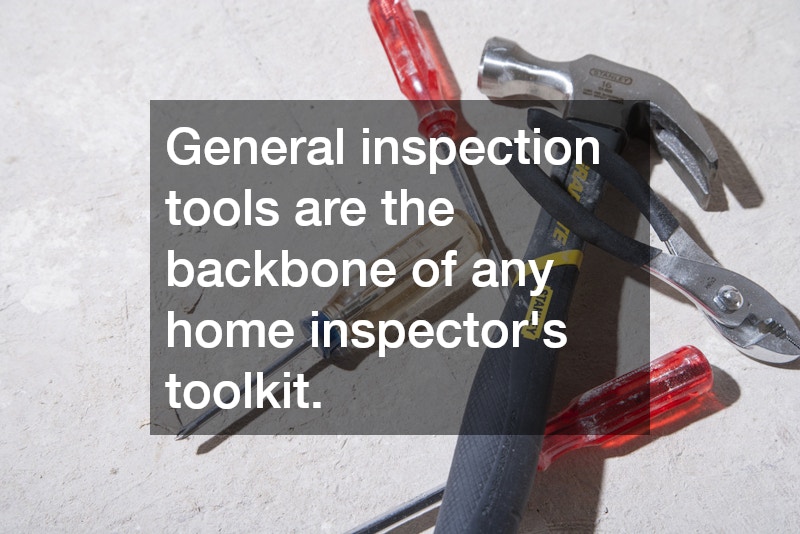In the realm of real estate, a thorough home inspection is paramount in evaluating the condition of a property. Home inspectors rely on a multitude of specialized tools to perform accurate and comprehensive inspections. In this article, we delve into the essential home inspector tools required for effective home inspections, answering common questions along the way.
What are the Essential Tools Every Home Inspector Should Have?
General Inspection Tools
General inspection tools are the backbone of any home inspector’s toolkit. Flashlights provide essential illumination in poorly lit areas, ensuring no detail is missed during inspections.
Measuring tapes assist in verifying dimensions of rooms or structures, while notebooks are indispensable for jotting down observations and details that are critical for thorough documentation.
During any inspection, the accuracy of measurements and details captured is vital for producing a reliable report. These tools are not only crucial for initial assessments but also aid in creating a comprehensive record of the property’s current condition. Home inspectors use these tools to ensure that they can revisit notes and measurements long after the inspection is complete, maintaining a high standard of professionalism.
Through the use of general inspection tools, inspectors lay the foundation for the entire inspection process. Proper documentation and measurements make it easier to track changes or recommend repairs, adding value to the service provided. Homeowners and potential buyers alike benefit from this thorough approach, which is essential in making informed decisions regarding the property.
Advanced Diagnostic Tools
Advanced diagnostic tools offer insights beyond what the naked eye can observe. Thermal imaging cameras are particularly effective at detecting heat loss, electrical issues, and insulation deficiencies that might otherwise go unnoticed. Moisture meters, meanwhile, are essential for identifying areas of water intrusion or potential mold risks, providing vital data for property assessments.
These tools enhance the thoroughness of home inspections by uncovering issues that could lead to significant problems if left untreated. By identifying hidden concerns early, advanced diagnostic tools prevent costly repairs and protect the investment of potential buyers. Moreover, they demonstrate an inspector’s commitment to detail-oriented service, enhancing their reputation and client trust.
Integrating advanced diagnostic tools into inspection practices reflects an evolving industry that leverages technology to improve accuracy. As properties become more sophisticated, the demand for high-tech solutions increases, ensuring competitive standards in home inspection. For inspectors, staying updated with these tools is not just an enhancement of service but also a critical component in their professional toolkit.
Electrical and Plumbing Tools
Electrical and plumbing systems form the infrastructure of any home, making their inspection crucial prior to any property transaction. Circuit testers are essential tools that ensure the electrical systems are safe and functional, identifying faults that may pose significant hazards. Pressure gauges, on the other hand, help assess the integrity and efficiency of plumbing systems by measuring water pressure accurately.
These specialized tools provide a layer of security by allowing inspectors to verify systems that are critical for a home’s functionality. Without these evaluations, buyers may face unexpected issues that could result in extensive repairs or renovations. Inspectors who specialize in electrical and plumbing inspections often rely heavily on these tools to fulfill their professional duty of care and ensure quality service.
The utilization of electrical and plumbing tools underscores the comprehensive nature of home inspections. They provide clients with peace of mind, knowing that the reliability of these fundamental systems has been thoroughly assessed. Furthermore, these tools help inspectors provide precise information that forms the basis of actionable insights for property maintenance or improvement.
How Do These Tools Enhance the Home Inspection Process?
Improving Accuracy and Reliability
The use of appropriate tools in home inspections significantly boosts the accuracy and reliability of the findings. By employing thermal imaging cameras and moisture meters, inspectors can offer detailed reports that reflect the true condition of the property. This precision fosters trust with clients, ensuring transparency and helping to avoid costly oversight in the post-purchase phase.
Increasing Efficiency and Coverage
The right set of tools not only enhances inspection quality but also significantly increases efficiency. By enabling inspectors to conduct more thorough inspections in less time, these tools enhance productivity and allow for broader coverage. This means inspectors can schedule more appointments without compromising the depth and effectiveness of their assessments.
Conclusion
In summary, the role of a home inspector is heavily reliant on the quality and variety of their tools. From basic handheld devices to sophisticated diagnostic equipment, the right tools not only ensure a comprehensive inspection but also build confidence in the findings presented to clients. As the real estate market evolves, continuously updating and refining these tools will remain a cornerstone of effective home inspection practices.
.


